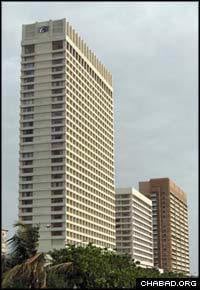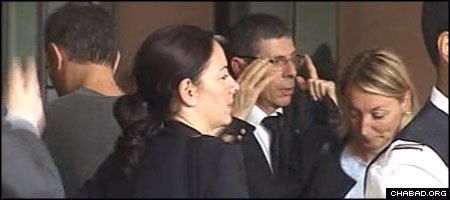Were it not for a wedding function at Mumbai’s Oberoi Trident Hotel last month, diamond industry professionals Toni Nagel of the United Kingdom and Marc Schwalb of Belgium might not have made it back home before the conclusion of India’s worst terror attack. The two Jewish survivors were among an estimated 250 people rescued by security services at the Oberoi before a final assault on the Chabad-Lubavitch center where Rabbi Gavriel and Rivka Holtzberg and six others died.
Schwalb had actually had dinner at the Chabad House five days before a team of Islamist terrorists held a series of tourist destinations and city buildings hostage for more than 60 hours. Almost 160 people perished in the attacks; more than 294 were injured.
The following Tuesday, one day before the attacks, Gavriel Holtzberg gave Schwalb a tour and offered for him to stay at the Chabad House on his next trip.
“He showed me the whole house,” said Schwalb, 66, who hosted a meal at the Chabad House of Antwerp last week to thank G‑d for his survival. “ ‘Have a look at the rooms,’ he said. ‘It’s not a five-star hotel, but it’s nice.’ ”
After stopping off at the Chabad House one last time on Nov. 26, Schwalb, 66, returned to his hotel room on the 19th floor to finish packing before his scheduled nighttime flight home. Nagel, meanwhile, was in the elevator when the shooting began.
“Suddenly, I heard a terrible noise, horrible shooting,” related Schwalb. He walked across the hall to peer at the atrium below, where he saw gunmen with backpacks firing AK-47 assault rifles randomly into packs of people and diners at the hotel’s restaurant.
“They were shooting at everything: the restaurant, the lobby,” said Schwalb. “Afterwards, they took hostages.”
Having heard the initial bursts of gunfire from the elevator, Nagel saw the lobby empty when she stepped out of the elevator, save for a lone gunman making his way up to the mezzanine.
Schwalb rushed into his room and shut the door. Under the impression that things would quickly be handled by security personnel and the police, he continued packing.
Nagel dialed every extension number in the hotel directory. No one answered.
Because “the shooting was still pretty intense,” she turned on the news.
In the first several hours of the attack, “the only news was Bangkok,” said Nagel, referring to the takeover of several airports by anti-government forces in and around Thailand’s capital. Soon, stations started covering a hostage crisis taking shape at the Taj Mahal Hotel not far from the Oberoi, but it seemed that no one knew of the attack in their own building.
Nagel called colleagues elsewhere in India and London to find out information.
From his phone, Schwalb, tried to call the Holtzbergs to let them know where he was.
“I realized later when I saw” the Chabad House on the television that the building was also taken over by terrorists.
“I didn’t know when I said goodbye to Rav Gavriel, that it would be forever,” he said, choked up by tears. “It’s terrible, terrible.”

Waiting in the Dark
With no let up in the shooting, each barricaded the door. When smoke from fires either set by the terrorists or caused by one of several exploding grenades began pouring under the door, Nagel doused her curtains with water.
“But the smoke got thicker and thicker,” she said.
Well into the second day of the crisis, Schwalb decided to break some side windows. It took considerable effort, but he was finally able to lean out and breathe some fresh air.
By now, the news was broadcasting the attack in the Oberoi and Nagel dialed a help number that flashed across the screen. Thinking she was calling the police, she gave over her name and room number, all over the sound of the fire alarm in the room.
“They kept asking questions,” she said, “it wasn’t very helpful.”
Soon, she realized that she was actually speaking to the news station, which was broadcasting her own voice on television.
“I was trying to keep my wits about me,” said Nagel. “I was thinking this might take along time. Do I have water? Do I have food?”
She managed to sleep a little.
“If I didn’t sleep, I wouldn’t have strength,” she said. “I didn’t know how long the adrenalin would last.”
Nagel used the time to talk on her cell phone to her husband and two sons, aged seven and nine.
“I spoke in a very calm, relaxed way,” said Nagel. “I didn’t want to panic anyone. I didn’t want to be dramatic.
Schwalb spoke with his wife, who called the Belgian consul.
“I was scared to death,” said Schwalb. “The first time I was scared was when the hotel was on fire and the room filled with smoke.
“The second time was three in the morning, when I saw the hostages taken on T.V. I didn’t know where, probably on the 18th floor.”
Late the next day, military commandos banged on guests’ doors.
The black-garbed troops escorted them to an indoor fire escape. On the way, Schwalb saw three women dead on the floor and 18 survivors gathered in another room. There was a Muslim Turkish couple who said they were among the hostages.
“She couldn’t stop crying,” said Schwalb. “The terrorists shot all the other guys who were non-Muslims.”
Using their cell phones as flashlights and remaining completely silent, the group safely made it out of the hotel.
“I didn’t feel safe, though, until I was sitting on the airplane and the engines went on,” said Nagel. “I just wanted to get out of there as soon as possible. And I wanted to get home before Shabbat.”
Schwalb made it home Friday morning, together with the tallit and tefillin that he kept with him throughout the ordeal.
After making a blessing for her deliverance at synagogue, Nagel shared her story with Imperial College students at the Kensington Chabad Jewish Centre in London. At the event, people resolved to do good deeds in memory of those lost in the tragedy.
“I’m just completely lucky,” said Nagel. “I feel gutted for all those who were killed.”







Join the Discussion